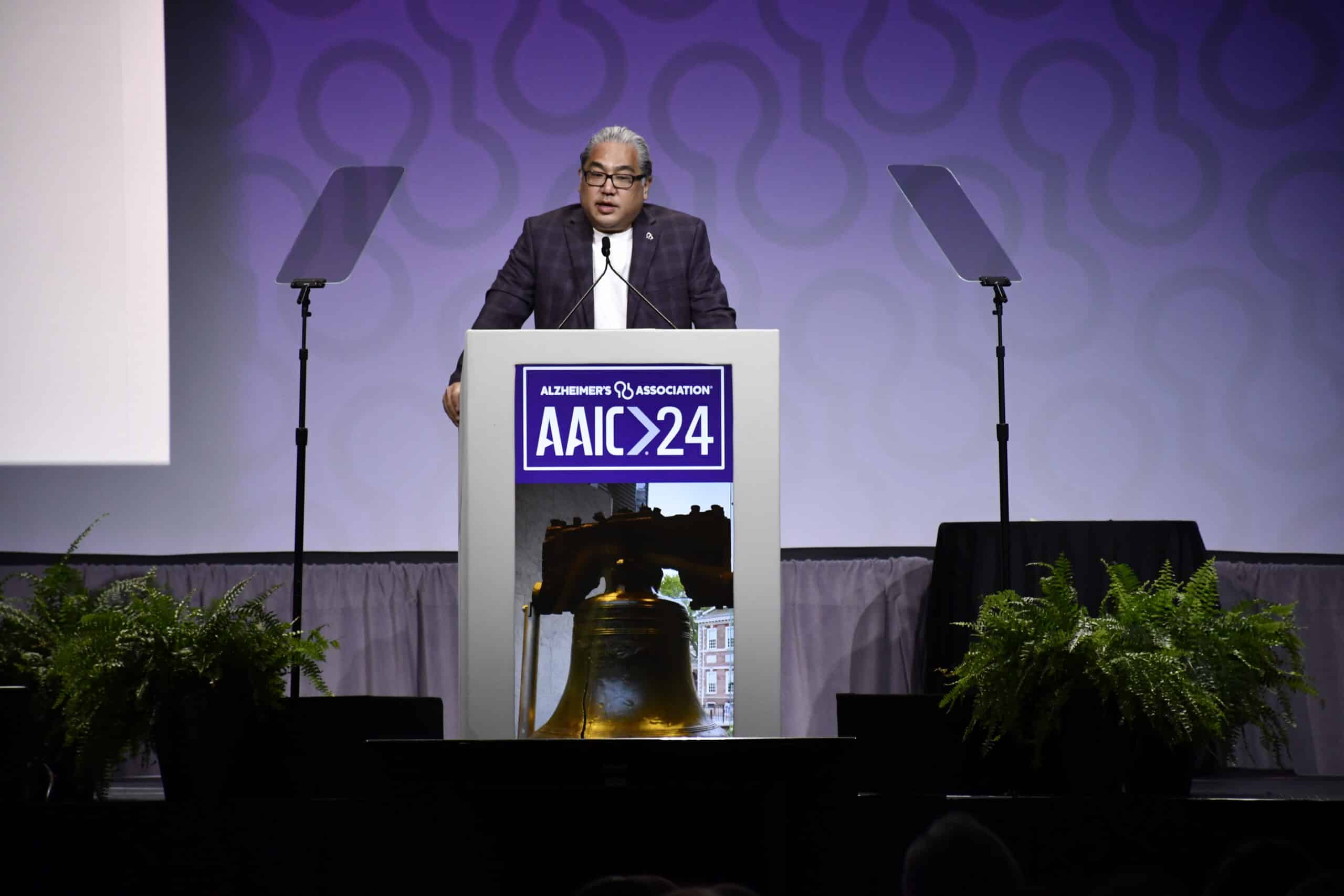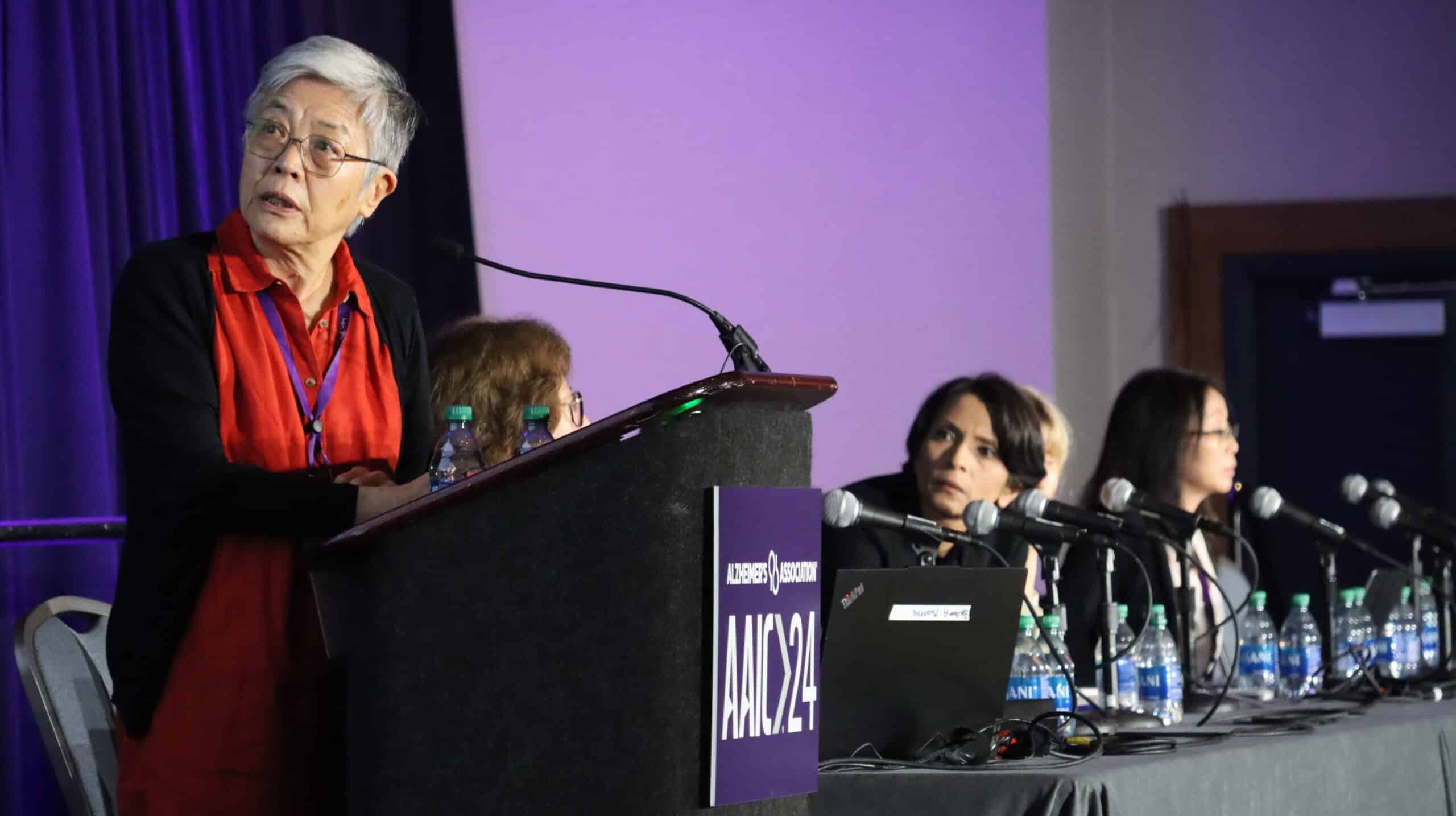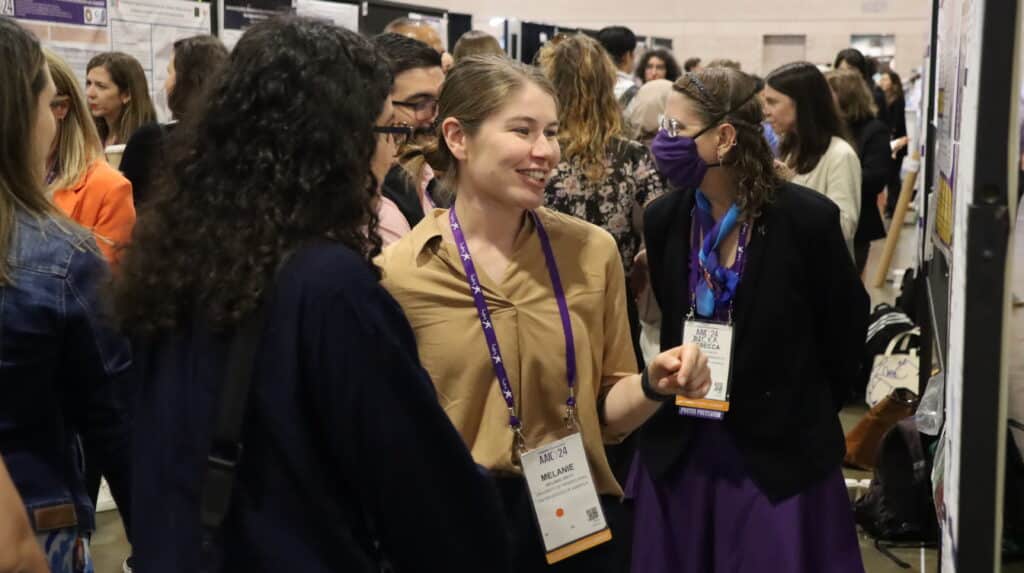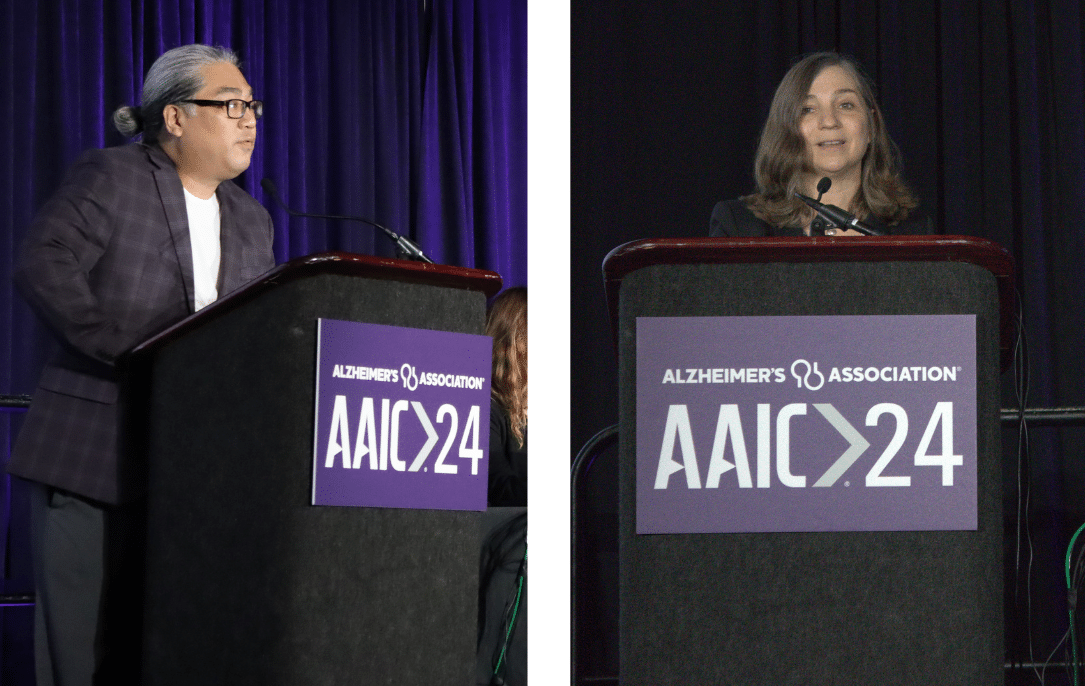This week, researchers and clinicians from around the world convened in Philadelphia for the 2024 Alzheimer’s Association International Conference (AAIC) to discuss recent advances in Alzheimer’s disease and related dementias. Check out:
📰 Big news in Alzheimer’s space: Research breakthroughs presented at AAIC
📌 Penn at AAIC: Panel discussions, posters, and talks
🌍 From around the world: Global perspectives on Alzheimer’s research
🌐 In the news: Media coverage of AAIC
——————————————————————————————————————
Big news in Alzheimer’s space
A blood test accurately diagnosed Alzheimer’s 90% of the time, study finds

The study suggests that routine blood tests for cognitive impairment could become a part of primary care checkups. “This study adds to the revolution that has occurred in our ability to measure what’s going on in the brain of living humans,” said Penn Memory Center Co-Director Jason Karlawish, MD.
Experts caution that blood tests should be part of a comprehensive diagnostic process, especially since the pathology of Alzheimer’s can develop years before symptoms appear.
——————————————————————————————————————
Wildfire smoke linked to increased dementia risk: New study reveal
Breathing in wildfire smoke isn’t just bad for the lungs; it’s also associated with a higher risk of dementia. Researchers from the universities of Pennsylvania and Washington have found that for every extra microgram per cubic meter of smoke, there’s a 21% higher risk of developing dementia.
Holly Elser, MD, PhD, a neurology resident at the University of Pennsylvania, presented her research on this link at the 2024 Alzheimer’s Association International Conference. The study analyzed health records of over 1.2 million Southern Californians. The findings suggest that pollutants from wildfire smoke may be more harmful to the brain than other sources.
Protective measures include updating air filtration systems and using N95 masks during poor air quality days.
——————————————————————————————————————
Penn at AAIC 2024:
Panel discussions, posters, and talks
Edward Lee kicks off AAIC with insights on neuropathology
Edward Lee, MD, PhD, associate director of the Penn Alzheimer’s Disease Research Center and co-director of the Penn Institute on Aging, delivered this year’s first plenary talk at Alzheimer’s Association International Conference.
He welcomed everyone to the City of Brotherly Love and spoke on “Neuropathology in a Multidisciplinary Age.” Dr. Lee highlighted how neuropathology synergizes with other disciplines and discussed the impact of air pollution and redlining on brain health.
Dr. Lee also shared valuable insights with students at a separate AAIC workshop focused on mentoring. “As a scientist, nothing is more important than your reputation,” Dr. Lee stated. He emphasized the value of lab culture, the importance of finding the right people, and the necessity of carving out time and space for deep thinking, often finding his best ideas during walks across campus
——————————————————————————————————————
Virginia Lee leads panel on tau aggregation
Virginia Lee, PhD, one of the Alzheimer’s field’s most recognized researchers, led a panel on the causes and consequences of tau aggregation in tauopathies. As the director of the Center for Neurodegenerative Disease Research (CNDR) at the University of Pennsylvania, Dr. Lee studies the role of different proteins in various neurodegenerative disorders of aging, including Alzheimer’s disease.
Dr. Lee’s work has focused on understanding how misfolded proteins like tau can spread from cell to cell, contributing to the progression of neurodegenerative diseases such as Alzheimer’s and Parkinson’s.
Her research has opened new avenues for potential treatments by identifying these proteins as key targets. In recognition of her contributions, Dr. Lee received the prestigious $3 million Breakthrough Prize in Life Sciences in 2019. Learn more about Dr. Lee’s work here.
——————————————————————————————————————
Paul Yushkevich and David Wolk highlight Penn’s work on LATE at panel discussion
Paul Yushkevich, PhD, associate professor in the Department of Radiology at the University of Pennsylvania, participated in a panel discussion on LATE, a brain disorder that causes dementia in older individuals, showcasing how Penn Memory Center (PMC) research is leading the field on this recently characterized cause of dementia. David Wolk, MD, PMC co-director and Alzheimer’s Disease Research Center director, moderated the panel discussion. Learn about LATE here.
——————————————————————————————————————
Penn researchers and clinicians leading AAIC research sessions
Penn researchers and clinicians had a strong presence at the Alzheimer’s Association International Conference, contributing to several key sessions.
Christopher Brown, MD, PhD, Penn Memory Center Clark Scholar and instructor in Neurology at the University of Pennsylvania (far right, first photo), presented on how tau pathology spreads in the brain, using unique starting points and brain connections.
Pulkit Khandelwal, MS, a PhD student in the Penn Image Computing and Science Lab (PICSL) (far right, second photo), highlighted the use of high-resolution 7-tesla MRI scans to study brain changes in neurodegenerative diseases. His work focuses on understanding the relationship between brain structure and disease.
Xueying Lyu (third photo), a bioengineering PhD student at the University of Pennsylvania, shared insights into the different paths Alzheimer’s disease can take, using imaging to map out the progression of the disease.
——————————————————————————————————————
Penn researchers lead the way at AAIC, showcasing Alzheimer’s Research
Penn researchers and trainees were at the forefront of AAIC, showcasing their work and advancing Alzheimer’s research through presentations by Katheryn Cousins, PhD; Christopher Brown, MD, PhD; (former trainee) Kimberly Halberstadter; Corey McMillan, PhD; Maja Højvang Sørensen, PhD; Pavel P. Kuksa, PhD; Lauren Fisher, RN; Long Xie, PhD; Laynie Dratch, SCM, CGC; Daniel Ohm, PhD; Naomi Nevler, MD; Melanie Matyi, PhD; Oonjee Oh, RN; Rory Boyle, PhD; (former trainee) Rachel Rovere; Erin Liebenberg; Rogan Magee, MD, PhD; Sumita Garai, PhD; Mohammad Taghvaei, PhD; Aaron Barbour, PhD; Sunghye Cho, PhD; Stanislau Hrybouski, PhD; (former trainee) Bryan James, PhD; Zhijian Yang, PhD; and Eric Teunissen-Bermeo.
——————————————————————————————————————
From around the world:
Global perspectives on Alzheimer’s research
Panel presentation on the global dementia plan
A panel presentation on the global dementia plan explored the report “A Right to be Heard: Better palliative and end-of-life care for people affected by dementia,” published by King’s College London. The report highlights the challenges and disparities faced by individuals with dementia and their caregivers. The authors call for prioritizing dementia as a life-limiting condition, ensuring equitable access to integrated care, optimizing investment in end-of-life care closer to home, and investing in palliative care research. These recommendations aim to improve the quality of life for people with dementia, reduce unnecessary hospitalizations, and support them in their preferred place of care.
——————————————————————————————————————
Bringing research to the community:
Highlights from AAIC for All
AAIC for All, an extension of the Alzheimer’s Association International Conference (AAIC), offered a unique platform for clinicians and community members to learn about the latest advancements in dementia research. This free event, held on the final day of AAIC, featured presentations from leading experts, including Edward Lee, MD, PhD, associate director of the Penn Alzheimer’s Disease Research Center and co-director of the Penn Institute on Aging, and Dawn Mechanic-Hamilton, PhD, director of cognitive fitness programs and neuropsychological services at the Penn Memory Center.
Dr. Lee’s presentation, “Brain Donation: The Gift of Knowledge,” emphasized the critical role of brain donation in advancing our understanding of dementia. Dr. Mechanic-Hamilton’s session, “How Can We Improve Cognitive Testing? The Answer May Be In The Palm Of Your Hand,” explored innovative approaches to cognitive assessment, emphasizing the potential of digital tools.
In preparation for AAIC for All, Penn Memory Center (PMC) hosted a virtual discussion group for patients and caregivers. Facilitated by PMC Co-Director Jason Karlawish, MD, and Shana Stites, PsyD, MA, MS, assistant professor in the Department of Psychiatry, clinical psychologist, and quantitative researcher, the group covered topics such as early detection, treatment options, and navigating the conference. Key takeaways included the importance of specific diagnoses and the growing impact of industry interest in dementia care.
Dr. Stites’ contributions to AAIC included workshops and poster presentations on neuroimaging accessibility, equity in Alzheimer’s disease research, and subjective cognition in older adults. Dr. Karlawish presented findings from the REVEAL-SCAN study, which highlighted the psychological and cognitive impacts of learning one’s amyloid PET scan results, particularly among Black participants. This study underscores the importance of considering psychological factors in Alzheimer’s research.
——————————————————————————————————————
In the news:
Media coverage of AAIC
- AAIC: This obesity and diabetes drug might work for Alzheimer’s symptoms | Being Patient
- Weight-loss drug could help slow Alzheimer’s cognitive decline, trial finds | The Guardian
- Shingles vaccine linked with lower dementia risk, study shows | The Washington Post
- Alzheimer’s disease blood tests could improve diagnosis, support recruiting for research and speed access to treatment | en español
- Exposure to wildfire smoke greatly raises risk of dementia diagnosis | en español







